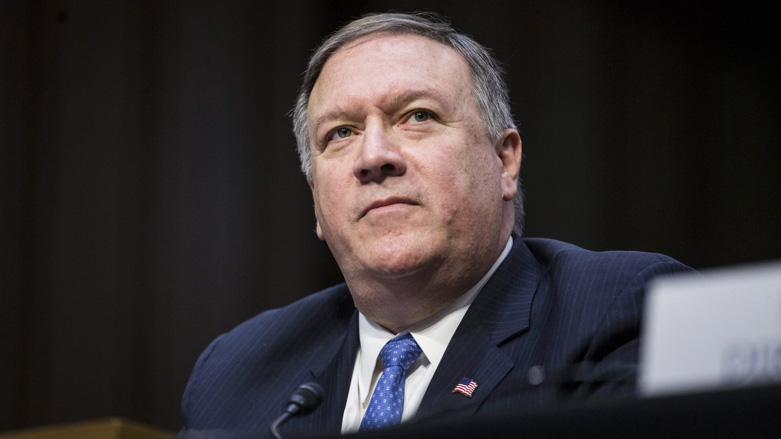Mike Pompeo blasts predecessor for dealings with Iran

WASHINGTON DC (Kurdistan 24) - US Secretary of State Mike Pompeo has strongly criticized John Kerry, Secretary of State under Barack Obama, for meeting with Iranian Foreign Minister Mohammad Javad Zarif and undermining Trump administration policy.
In an interview on Wednesday to promote his newly-published memoirs, Kerry acknowledged having met Zarif “three or four times” since leaving office.
Asked about that on Friday, Pompeo denounced Kerry’s actions as “unseemly and unprecedented.”
“This is a former secretary of state engaged with the world’s largest state sponsor of terror,” Pompeo continued, and “he was telling them to wait out this administration.”
Kerry was a key figure in negotiating the 2015 Iran nuclear deal, known as the Joint Comprehensive Plan of Action (JCPOA.)
The Trump administration left the JCPOA in May, denouncing it as a “bad deal” that failed to stop Iran’s nuclear program or address Iran’s broader aggression in the region.
Addressing the State Department press corps, Pompeo noted that Iran had twice attacked US targets in Iraq over the past week.
Tehran “fired Katyusha rockets toward the [US] embassy in Baghdad and took action against our consulate in Basra,” he said, referring to the three rockets that targeted the international airport, where the consulate is located.
As Pompeo’s statement suggests, the Trump administration does not differentiate between the actions of Iran and the actions of the militias it supports.
Washington is holding Iran responsible for its proxies’ actions, as the White House warned on Tuesday, thus renewing the Reagan administration’s policy toward terrorism: focus on state sponsors.
That contrasts with the Obama administration, which basically sought to accommodate Iran, and, therefore had no fight with it, or even the Bush administration.
During George W. Bush’s presidency, the US faced an Iranian-sponsored campaign targeting coalition forces during Operation Iraqi Freedom.
Rep. Michael McCaul (R, Texas) has suggested that Iran was responsible for over 1,000 US casualties in Iraq. However, the Bush administration never threatened Tehran clearly and directly for the actions of its proxies. Instead, it dealt with the “networks”—fighting and capturing individuals directly involved.
Arguably, it would have been more effective to hold Tehran responsible, as the Trump administration has said it will do.
Pompeo has done a great deal to fill the many vacancies in senior State Department positions that he inherited from his predecessor, Rex Tillerson, and he noted his achievements.
However, an important position remains vacant: Assistant Secretary of State for Near East Affairs (NEA.)
David Schenker, who served in the Bush 43 Pentagon, has been nominated for the position. Schenker had his confirmation hearing in June and has no personal problem, an informed source told Kurdistan 24.
But he has yet to be confirmed, and Pompeo called on the Senate to do so.
That vote is being held up, because Sen. Tim Kaine (D, Virginia) is demanding the administration release a memo that provides the legal basis for its strike on Syria last year for its use of sarin gas in Khan Sheikhoun.
The lack of a senior State Department official who covers the Middle East has had major consequences for Iraq, including the Kurdistan Region.
Absent a top NEA official, Brett McGurk, whom Obama appointed Special Presidential Envoy to the Global Coalition against the Islamic State (IS), stepped into the void, expanding his portfolio to include Iraq.
A lawyer, McGurk lacks a background in the history, language, and culture of the region. He is known in Baghdad for being pro-Shi’a and, conversely, unfriendly to Kurds and Sunni Arabs.
McGurk’s missteps are astonishing. He strongly opposed the Kurdistan independence referendum and claimed he could get the Kurdish leadership to drop it. He failed.
McGurk led the unexpectedly strong US opposition to the referendum, causing others—including Iraqi Prime Minister Haider al-Abadi, Iran, and Turkey—to oppose it, as well.
The Kurdish leadership, in fact, had an understanding with Abadi. They would proceed with the referendum—not a declaration of independence; just a vote—and then support Abadi in the 2018 elections.
But with the US opposing the referendum, Abadi joined in an Iranian scheme to attack Kirkuk and other disputed territories. McGurk failed to inform the White House of Tehran’s role in the assault, and Washington looked the other way, as it occurred.
The attack did not do much for Abadi’s standing in Iraq, but it enhanced that of the Popular Mobilization Forces (PMF), the Iranian-backed militias, who played a central role.
Thus, the PMF list finished second in Iraq’s May 12 elections, ahead of Abadi’s list, which placed third.
McGurk made Abadi the US candidate in Iraq, but it does not look like Abadi will get a second term, and significant uncertainties loom.
An NEA Assistant Secretary of State would have had authority over McGurk and that might well have resulted in more thoughtful US decision-making.
Kaine is fully aware of Abadi’s shortcomings and is sympathetic to Kurdish aspirations. He was among a group of senators who wrote Abadi last year, warning against continuing his aggression against the Kurds, and in February, Kaine met with Masrour Barzani, Chancellor of the Kurdistan Region Security Council, when Barzani visited Washington.
Hopefully, this issue can be settled soon, lest more troubles ensue.
